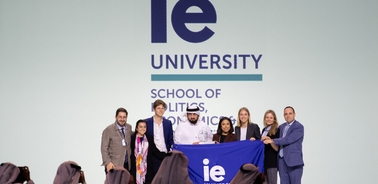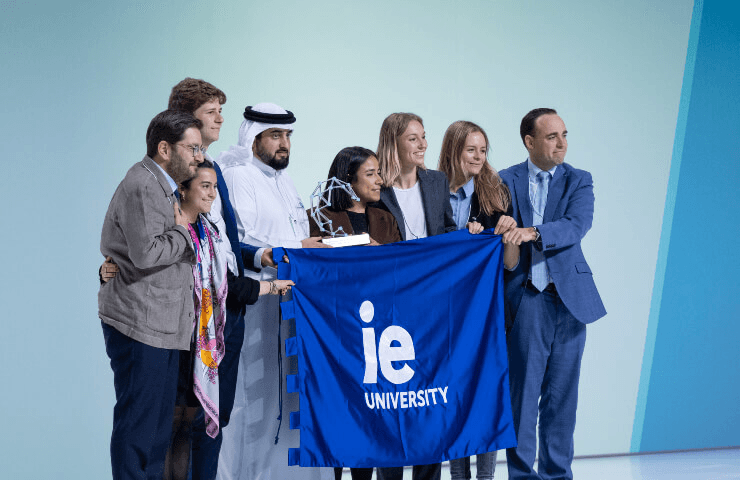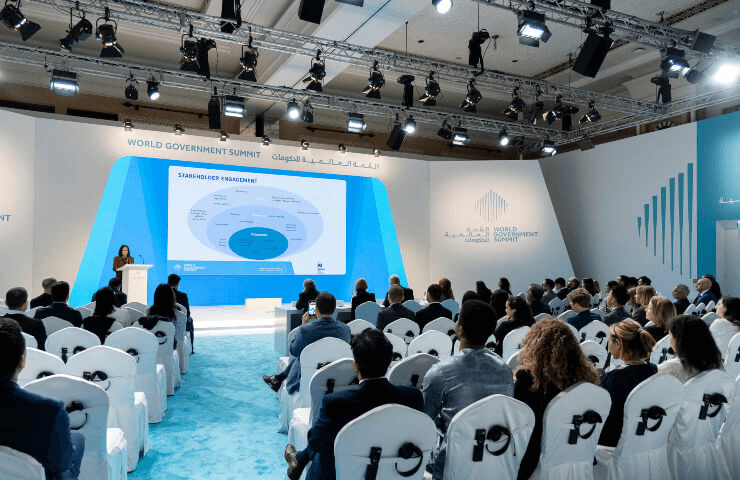IE School of Politics, Economics and Global Affairs students win Global University Challenge at the World Government Summit

Students from IE University won this innovative competition with a proposal for a Universal Digital Rights Charter.
A team of five students representing IE School of Politics, Economics and Global Affairs was awarded the first prize of the Global University Challenge, an innovative competition that aims at shaping the future of governance and was organized at the World Government Summit in Dubai on February 13-15.
The graduate students won with a proposal for the creation of a universal charter on digital human rights focused on outlining the key principles and corresponding rights that should be incorporated in a future charter. They demonstrated an innovative mindset and a deep knowledge of multilateral organizations and global diplomacy.
“Anton, Mariana, Melanie, Neda and Samantha illustrate the best of our School: diversity, innovation and sensitivity towards the global challenges we confront, and a drive to address them and make a better world.”
Ángel Alonso Arroba, Vice Dean of IE School of Politics, Economics and Global Affairs
“It has been a real pleasure to support this fantastic team that worked hard and produced an excellent proposal on what a universal declaration of digital rights should encompass and how it could be brought about,” said Ángel Alonso Arroba, Vice Dean of IE School of Politics, Economics and Global Affairs, who mentored the students through the challenge. “Anton, Mariana, Melanie, Neda and Samantha illustrate the best of our School: diversity, innovation and sensitivity towards the global challenges we confront, and a drive to address them and make a better world. We are honored by this recognition. Just being here and participating was a privilege for which we are very grateful. I am sure this will be an unforgettable experience that our students will treasure for life.”
Aiming at advancing human rights in the digital space, the project presented by IE University students to a panel of international experts stood out for its multistakeholder engagement and consultation process, its implementation strategy, and especially its feasibility in the context of real-life United Nations processes.
The team formed by Mariana Ferreira and Mélanie Houé from the Master in International Development, Neda Keshtkar and Samantha Lee Dukes from the Master in International Relations, and Anton Sadtler from the Master in Applied Economics accepted the challenge to elaborate a proposal for a Universal Digital Rights Charter in less than 48 hours and had to present it in only five minutes. They competed with other students coming from 12 leading academic institutions from around the globe, including Harvard Kennedy School, Princeton School of Public and International Affairs, Tuck School of Business, University of Sydney, Lee Kuan Yu School of Public Policy, University College London (UCL), and others.
“It has been a great personal journey participating in this challenge and meeting so many students from other top universities. We had an opportunity to put into practice some of the knowledge and skills we are acquiring in our master programs at IE University.”
Neda Keshtkar, Master in International Relations student
“It has been a great personal journey participating in this challenge and meeting so many students from other top universities. We had an opportunity to put into practice some of the knowledge and skills we are acquiring in our master programs at IE University, and are thrilled that the jury and the team of the Global Government Summit appreciated so positively our proposal with such recognition,” highlighted student Neda Keshtkar.
At the World Government Summit, Manuel Muñiz, Provost at IE University and Dean of IE School of Politics, Economics and Global and Public Affairs, took part in a series of panels in which he shared his vision on the Future of Education and Lifelong Learning and on the critical challenges to the Global Order.
He exchanged views with edX Founder Anant Agarwal, Coursera CEO Jeff Maggioncalda, and Udacity co-Founder Sebastian Thrun, among others, and argued that that education must become much more modular, practical, and tied to the job market. “All in all, lifelong learning will be the key to the future of higher education,” he said.
The World Government Summit is a neutral, non-profit organization that serves as a platform for the public and private sectors to convene and collaborate with world-renowned experts to create a positive impact for citizens worldwide.
The Global University Challenge is a unique global initiative that brings together over top students from renowned institutions across the globe and engages them in an innovative competition to improve the way governments work. The Challenge convenes tomorrow’s leaders with today’s policymakers to address the future of government, governance and policymaking.

